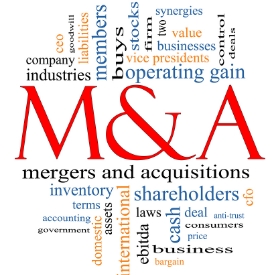- ERC Tax Return Amendment Rules Change - March 25, 2025
- Safe Financial Instruments Guide - December 4, 2024
- New Overtime Rule Increases the Salary Exemption Thresholds - November 19, 2024
Do you have a Question?
Ask below. One of our Investors or Advisors will Answer!
EBIT Definition: an Acronym for Earnings Before Interest and Taxes
EBIT is a term commercial bankers , investment bankers, Chief Financial Officers and other financial advisors often use as a measure of a business’s earnings from operations. It is an acronym for Earnings Before Interest and Taxes.
, investment bankers, Chief Financial Officers and other financial advisors often use as a measure of a business’s earnings from operations. It is an acronym for Earnings Before Interest and Taxes.
- EBIT reveals operating profitability without non-recurring or unusual income or expenses
- EBIT measures operating profitability by eliminating financial expenses a business may incur
- EBIT is helpful when you want to compare several businesses with different tax and/or capital structures
When selling a business, this measurement is very important to investors and buyers and is often included in other financial ratios to determine the business value. As for business owners, it’s also worth keeping track of as it’s an indication of the financial overall health of the business.
EBIT is not a Generally Accepted Accounting Principle (GAAP), however it is a very popular measurement in the financial and investment communities.
How to Calculate EBIT
To calculate EBIT, start with the Net Income or Net Operating Income for the business for a given period of time. Normally, it is a twelve month period and most often either the previous rolling twelve months or fiscal year. The Net Operating Income will appear above the Extraordinary Income or Expenses line on the company’s Profit and Loss Statement, also known as the Income Statement.
Add to the Net Operating Income any Interest Expense incurred by the business such as interest paid to banks, financing companies, vendors, suppliers, lenders, and the business owners;
Also add to the Net Operating Income any Tax Expenses paid that are not payroll related. The taxes to add back to the NOI are earnings taxes or taxes associated with income the company earned during the period being measured.
For example, the FICA, Medicare, and Unemployment taxes paid by the company for its employees would not be added back when computing EBIT. Such payroll taxes are ordinary and necessary to operate the business and generate a net profit. Similarly, sales taxes which may be paid or collected and included in the company’s Cost of Goods Sold or Operating Expenses are also not added back to income when computing EBIT. Whereas, the federal, state, and local taxes paid on behalf of the company’s earnings are not part of the business’s operations and are added back to the Net Operating Income.
It’s important to note that when you calculate EBIT, you do not add depreciation and amortization expense. If you do so, you would be computing EBITDA (Earnings Before Interest, Taxes, Depreciation and Amortization).
EBIT vs. EBITDA
EBIT and EBITDA are similar, however EBIT measures a business’s earnings from operations and EBITDA measures a business’s cash flow.














On an ASSET/INCOME restaurant purchase should there not be a value placed on the assets (FF&E) and added as a separate line item to help determine the asking price? For example: The restaurant generates $7,600,000.00 per year in income. Net profit averages 20-22% or approx. $1,550,000.00
When determining the asking price I plan to include a certain value for FF&E (combination of new and slightly used FF&E) and add via an increase in multiplier or an appraised value of same.
Thoughts?
With kind appreciation,
John:
It sounds like you have a healthy business there. 20% NET before tax is pretty good for a large restaurant.
As a buyer, I am looking for an investment that yields XX% return on my invested dollars. If that target is 15%, then working backwards, if your business generates 1.5MM, then I won’t pay more than 1.5MM/15% = 10,000,000. That will INCLUDE the value of all assets.
When you sell or buy a business on an asset sale, you will allocate how much of the purchase price to each asset. When the price exceeds the cost of the hard assets (likely it will), then the excess goes to Goodwill.
If your business barely breaks even or runs at a loss, you may need to sell BELOW asset cost.
You shouldn’t work this formula to determine the price based on expected return, THEN add in hard assets! The assets are part of the full price the buyer will calculate to determine if it meets his/her criteria.
We’re selling our business and started talking to a buyer. They want to know what our EBIT is over the past three years. I’ve asked my CPA to help with this and he’s telling me to give them the Net Income from Operations figures.
I don’t want to do something that my CPA disapproves of. Yet, given what I’ve read in your article I don’t think he’s right. What do you think I should give them?
Hi Samuel,
EBIT is a measurement of cash flow based on the Operating Income generated from the business. It is not the same measurement as Net Income from Operations for most businesses.
If a business pays interest to lenders or income taxes, these two amounts are added back to Net Income From Operations to compute EBIT.
Your buyer is trying to assess how much cash the business generates from its operations without regard to how the business is financed and before income taxes are paid on the net income earned.
EBIT is a relatively simple computation taken from amounts found on your business’ Profit and Loss Statement.
So, it’s fair to say… I don’t agree with your CPA’s instructions unless your business has no interest expense or income taxes on its P&L.
Hope this helps…